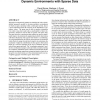Free Online Productivity Tools
i2Speak
i2Symbol
i2OCR
iTex2Img
iWeb2Print
iWeb2Shot
i2Type
iPdf2Split
iPdf2Merge
i2Bopomofo
i2Arabic
i2Style
i2Image
i2PDF
iLatex2Rtf
Sci2ools
101
click to vote
ATAL
2007
Springer
2007
Springer
Sharing experiences to learn user characteristics in dynamic environments with sparse data
This paper investigates the problem of estimating the value of probabilistic parameters needed for decision making in environments in which an agent, operating within a multi-agent system, has no a priori information about the structure of the distribution of parameter values. The agent must be able to produce estimations even when it may have made only a small number of direct observations, and thus it must be able to operate with sparse data. The paper describes a mechanism that enables the agent to significantly improve its estimation by augmenting its direct observations with those obtained by other agents with which it is coordinating. To avoid undesirable bias in relatively heterogeneous environments while effectively using relevant data to improve its estimations, the mechanism weighs the contributions of other agents’ observations based on a real-time estimation of the level of similarity between each of these agents and itself. The “coordination autonomy” module of a c...
Related Content
| Added | 07 Jun 2010 |
| Updated | 07 Jun 2010 |
| Type | Conference |
| Year | 2007 |
| Where | ATAL |
| Authors | David Sarne, Barbara J. Grosz |
Comments (0)

